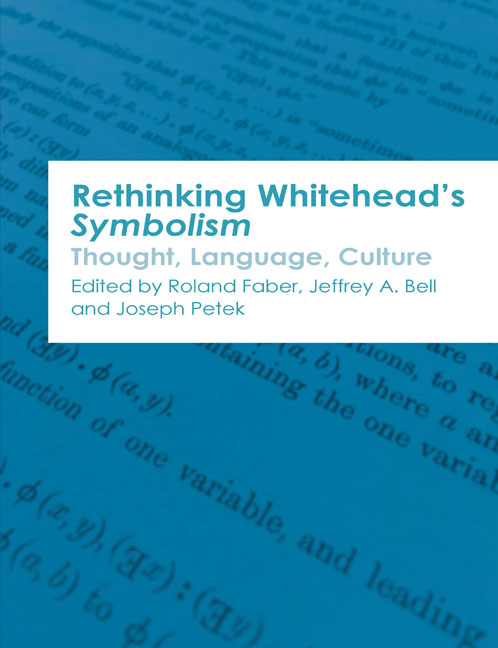Book contents
- Frontmatter
- Contents
- Abbreviations
- Introduction
- Part I Perception and Paradox
- Part II Adventures in Culture and Value
- Part III Misplaced Concreteness in Ethics and Science
- 8 A Dog's Life: Thought, Symbols and Concepts
- 9 From Manipulation to Co-creation: Whitehead on the Ethics of Symbol-Making
- 10 On Symbols, Propositions and Idiocies: Towards a Slow Technoscience
- 11 Of Symbolism: Climate Concreteness, Causal Efficacy and the Whiteheadian Cosmopolis
- Notes on Contributors
- Index
9 - From Manipulation to Co-creation: Whitehead on the Ethics of Symbol-Making
from Part III - Misplaced Concreteness in Ethics and Science
Published online by Cambridge University Press: 23 June 2018
- Frontmatter
- Contents
- Abbreviations
- Introduction
- Part I Perception and Paradox
- Part II Adventures in Culture and Value
- Part III Misplaced Concreteness in Ethics and Science
- 8 A Dog's Life: Thought, Symbols and Concepts
- 9 From Manipulation to Co-creation: Whitehead on the Ethics of Symbol-Making
- 10 On Symbols, Propositions and Idiocies: Towards a Slow Technoscience
- 11 Of Symbolism: Climate Concreteness, Causal Efficacy and the Whiteheadian Cosmopolis
- Notes on Contributors
- Index
Summary
Twenty-first-century humanity seems to have both far too much and far too little invested in symbolism. On one hand, the culture of late capitalism seems obsessively intent on insinuating increasingly manipulative and hard-to-ignore symbols – on increasingly diverse platforms – into the inner sanctum of our lives. In this sense, the human world is a veritable tangled thicket of symbols gone wild, one that literally calls out for Alfred North Whitehead's injunction to engage in a ‘continuous process of pruning’ so as to keep from being ‘overwhelmed by our symbolic accessories’ (S 61). It seems that everywhere we turn someone is trying to manipulate us with symbols.
On the other hand, it seems equally true that we are starved for the kinds of symbols that can provide real sustenance and connective power for the hard work we face of rescuing our vulnerable planet from imminent disaster. One might even ask whether our growing cynicism in the face of the manipulative symbols of the market has damaged our capacity to invest ourselves in more worthwhile symbols. Given that most of us have honed our critical thinking skills in the crucible of predatory market capitalism, is it any wonder that we feel cynical in the face of so many attempts to symbolise our higher ideals, whether they appear in the form of religious affirmations of universal love or ethico-political visions of global ecological unity? It does not help that justice-pursuing organisations of various kinds (including religious ones) feel compelled to resort to many of the same marketing techniques that are used to sell commercial products. By this logic, we might even be able to comprehend that bizarre conservative delusion that contemporary environmentalist calls to care for the health of our living biosphere originate in a liberal conspiratorial hoax to bolster the tyrannical power of ‘big government’.
In this cultural milieu it would seem vastly preferable to position oneself as a manipulator of symbols rather than submit to being manipulated by them. Within the terms of this perhaps more cynical but also more practical logic, the meanings of our symbols would ultimately be reducible to some underlying set of knowable realities.
- Type
- Chapter
- Information
- Rethinking Whitehead’s SymbolismThought, Language, Culture, pp. 170 - 185Publisher: Edinburgh University PressPrint publication year: 2017



